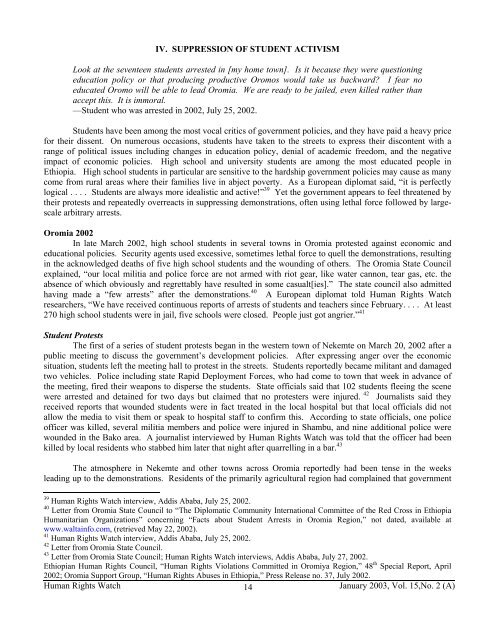Ethiopia lessons in repression: violations of academic problems, HRW
Ethiopia lessons in repression: violations of academic problems, HRW
Ethiopia lessons in repression: violations of academic problems, HRW
You also want an ePaper? Increase the reach of your titles
YUMPU automatically turns print PDFs into web optimized ePapers that Google loves.
IV. SUPPRESSION OF STUDENT ACTIVISM<br />
Look at the seventeen students arrested <strong>in</strong> [my home town]. Is it because they were question<strong>in</strong>g<br />
education policy or that produc<strong>in</strong>g productive Oromos would take us backward? I fear no<br />
educated Oromo will be able to lead Oromia. We are ready to be jailed, even killed rather than<br />
accept this. It is immoral.<br />
—Student who was arrested <strong>in</strong> 2002, July 25, 2002.<br />
Students have been among the most vocal critics <strong>of</strong> government policies, and they have paid a heavy price<br />
for their dissent. On numerous occasions, students have taken to the streets to express their discontent with a<br />
range <strong>of</strong> political issues <strong>in</strong>clud<strong>in</strong>g changes <strong>in</strong> education policy, denial <strong>of</strong> <strong>academic</strong> freedom, and the negative<br />
impact <strong>of</strong> economic policies. High school and university students are among the most educated people <strong>in</strong><br />
<strong>Ethiopia</strong>. High school students <strong>in</strong> particular are sensitive to the hardship government policies may cause as many<br />
come from rural areas where their families live <strong>in</strong> abject poverty. As a European diplomat said, “it is perfectly<br />
logical . . . . Students are always more idealistic and active!” 39 Yet the government appears to feel threatened by<br />
their protests and repeatedly overreacts <strong>in</strong> suppress<strong>in</strong>g demonstrations, <strong>of</strong>ten us<strong>in</strong>g lethal force followed by largescale<br />
arbitrary arrests.<br />
Oromia 2002<br />
In late March 2002, high school students <strong>in</strong> several towns <strong>in</strong> Oromia protested aga<strong>in</strong>st economic and<br />
educational policies. Security agents used excessive, sometimes lethal force to quell the demonstrations, result<strong>in</strong>g<br />
<strong>in</strong> the acknowledged deaths <strong>of</strong> five high school students and the wound<strong>in</strong>g <strong>of</strong> others. The Oromia State Council<br />
expla<strong>in</strong>ed, “our local militia and police force are not armed with riot gear, like water cannon, tear gas, etc. the<br />
absence <strong>of</strong> which obviously and regrettably have resulted <strong>in</strong> some casualt[ies].” The state council also admitted<br />
hav<strong>in</strong>g made a “few arrests” after the demonstrations. 40 A European diplomat told Human Rights Watch<br />
researchers, “We have received cont<strong>in</strong>uous reports <strong>of</strong> arrests <strong>of</strong> students and teachers s<strong>in</strong>ce February. . . . At least<br />
270 high school students were <strong>in</strong> jail, five schools were closed. People just got angrier.” 41<br />
Student Protests<br />
The first <strong>of</strong> a series <strong>of</strong> student protests began <strong>in</strong> the western town <strong>of</strong> Nekemte on March 20, 2002 after a<br />
public meet<strong>in</strong>g to discuss the government’s development policies. After express<strong>in</strong>g anger over the economic<br />
situation, students left the meet<strong>in</strong>g hall to protest <strong>in</strong> the streets. Students reportedly became militant and damaged<br />
two vehicles. Police <strong>in</strong>clud<strong>in</strong>g state Rapid Deployment Forces, who had come to town that week <strong>in</strong> advance <strong>of</strong><br />
the meet<strong>in</strong>g, fired their weapons to disperse the students. State <strong>of</strong>ficials said that 102 students flee<strong>in</strong>g the scene<br />
were arrested and deta<strong>in</strong>ed for two days but claimed that no protesters were <strong>in</strong>jured. 42 Journalists said they<br />
received reports that wounded students were <strong>in</strong> fact treated <strong>in</strong> the local hospital but that local <strong>of</strong>ficials did not<br />
allow the media to visit them or speak to hospital staff to confirm this. Accord<strong>in</strong>g to state <strong>of</strong>ficials, one police<br />
<strong>of</strong>ficer was killed, several militia members and police were <strong>in</strong>jured <strong>in</strong> Shambu, and n<strong>in</strong>e additional police were<br />
wounded <strong>in</strong> the Bako area. A journalist <strong>in</strong>terviewed by Human Rights Watch was told that the <strong>of</strong>ficer had been<br />
killed by local residents who stabbed him later that night after quarrell<strong>in</strong>g <strong>in</strong> a bar. 43<br />
The atmosphere <strong>in</strong> Nekemte and other towns across Oromia reportedly had been tense <strong>in</strong> the weeks<br />
lead<strong>in</strong>g up to the demonstrations. Residents <strong>of</strong> the primarily agricultural region had compla<strong>in</strong>ed that government<br />
39 Human Rights Watch <strong>in</strong>terview, Addis Ababa, July 25, 2002.<br />
40 Letter from Oromia State Council to “The Diplomatic Community International Committee <strong>of</strong> the Red Cross <strong>in</strong> <strong>Ethiopia</strong><br />
Humanitarian Organizations” concern<strong>in</strong>g “Facts about Student Arrests <strong>in</strong> Oromia Region,” not dated, available at<br />
www.walta<strong>in</strong>fo.com, (retrieved May 22, 2002).<br />
41 Human Rights Watch <strong>in</strong>terview, Addis Ababa, July 25, 2002.<br />
42 Letter from Oromia State Council.<br />
43 Letter from Oromia State Council; Human Rights Watch <strong>in</strong>terviews, Addis Ababa, July 27, 2002.<br />
<strong>Ethiopia</strong>n Human Rights Council, “Human Rights Violations Committed <strong>in</strong> Oromiya Region,” 48 th Special Report, April<br />
2002; Oromia Support Group, “Human Rights Abuses <strong>in</strong> <strong>Ethiopia</strong>,” Press Release no. 37, July 2002.<br />
Human Rights Watch<br />
14<br />
January 2003, Vol. 15,No. 2 (A)
















